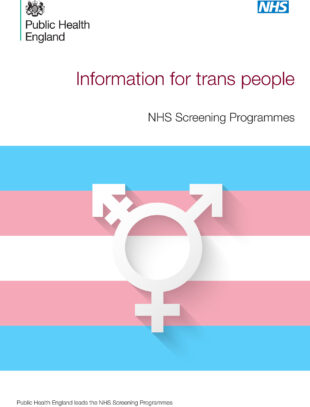
The NHS Screening Programmes in England have a duty to make sure everyone eligible for screening has access to it and understands its benefits and risks. As GPs we have an important role to play in helping to ensure this happens.
Many of you will be aware that PHE recently issued a new patient leaflet on screening for trans (transgender) and non-binary people in England.
It was introduced to help trans people decide with their GP whether screening is appropriate based on their own individual circumstances.
The leaflet explains about the adult NHS screening programmes that are available in England and sets out who we invite for screening.
We use trans as an umbrella term to embrace the diverse range of identities outside the traditional male/female definitions. These include transgender, gender fluid and non-binary.
Find more trans health information on NHS Choices here.
Helping trans people access screening

Millions of people are invited for screening every year based on their gender and age as registered by their GP.
For example, the NHS Abdominal Aortic Aneurysm (AAA) Screening Programme only sends screening invitations to individuals if they are registered with a GP practice as male and are in their 65th year.
However, this means invitations aren’t automatically sent to those who were male at birth, but now identify as female. Crucially, these individuals still retain the genetic risk of AAA.
It’s important to help these individuals understand that they should consider accessing screening and can contact their local AAA screening provider to arrange an appointment.
The new leaflet on screening for trans and non-binary people was badly needed because screening IT systems cannot routinely identify if a person’s gender is different to the gender they were assigned at birth.
This leaflet helps trans people access the screening that is most appropriate for them and take charge of their own health and wellbeing – as we should all be able to do.
I would strongly urge my GP colleagues to signpost their transgender and non-binary patients to this very useful resource when advising on screening services.
Confidentiality Issues
The Gender Recognition Act 2004 makes it an offence to disclose ‘protected information’ (which includes a person’s gender history after that person has changed gender) when that information is acquired in an official capacity.
This blog is not an encouragement for GPs to seek out all trans patients on their register and distribute the leaflet unless the GP knows the information will only go to the patient and not be viewed by anyone else.
This is a leaflet that we must present opportunistically when we are in contact with our trans population.
Learning disabilities
As GPs, we can also help reduce screening inequalities for patients with learning disabilities who, as we know, generally have lower levels of uptake and poorer health outcomes.
You can print out the easy read version of the appropriate screening information leaflet(s) for them and also make them and their carers aware of any additional support available to them.
As an example, PHE’s publication Cervical screening: supporting women with learning disabilities has some useful advice, including:
- how to increase a woman’s understanding of cervical screening
- making a best interest decision
- tips for primary care administration and reception staff
PHE recently published an updated version of their easy guide to breast screening which helps make breast screening equally accessible to women who have a learning disability or who struggle with written English.
PHE has also produced audio versions of its screening leaflets for blind and partially sighted people.
It’s an informed choice
The evidence on screening clearly shows it helps people make decisions about their health and can prevent disease and save lives.
But it’s important GPs help ensure everyone gets the information they need to decide if it’s the right thing for them depending on their circumstances.
Whether people read about screening in information leaflets or on NHS Choices, or by talking to their GP, they should make their decision based on the facts – it’s an ‘informed choice’.
Being aware of the information that’s available can help us, as GPs, to do our bit in enabling people to know what screening is available to them.
PHE Screening blogs
PHE Screening blogs provide up to date news from all NHS screening programmes. You can register to receive updates direct to your inbox, so there’s no need to keep checking for new blogs.